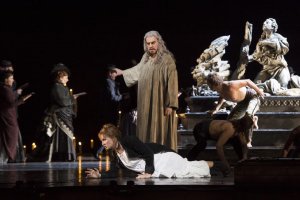

The opera is set on the island of Cyprus in the late 15th century.
#Verdi opera set in cyprus full#
Throughout the score, the orchestra plays a diverse role unprecedented in Italian opera, beginning with the impressive opening storm scene, in which the power of nature is depicted with full forces, including an organ, playing at the maximum possible volume. The latter are present most notably in Desdemona’s "Willow Song" and haunting “Ave Maria” in the last act and the baritone’s “Credo” at the start of Act II. The score of Otello is remarkable for its overall intensity and dramatic insight rather than the memorable solo numbers that made Verdi’s earlier works so popular. Otello almost wasn’t written: following the success of Aida and his setting of the Requiem mass in the early 1870s, Verdi considered himself retired, and it took Boito and publisher Giulio Ricordi several years to persuade him to take on a major new work. Shakespeare’s tale of an outsider, a great hero who can’t control his jealousy, was carefully molded by librettist Boito into a taut and powerful opera text. Often cited as Italian opera’s greatest tragedy, Otello is a miraculous union of music and drama, a masterpiece as profound philosophically as it is thrilling theatrically. Arrigo Boito, the librettist of Otello, was also a composer (his opera Mefistofele, based on Goethe’s Faust, premiered in 1868) as well as a journalist and critic. this Saturday, April 23, with a performance of Otello by Giuseppe Verdi. Metropolitan Opera broadcasts continue on Classical 90.5 at 10:00 a.m.


 0 kommentar(er)
0 kommentar(er)
